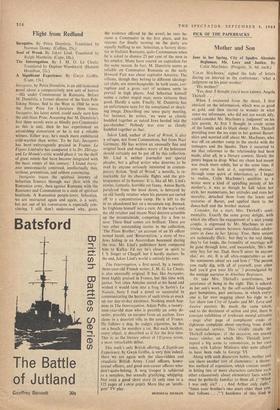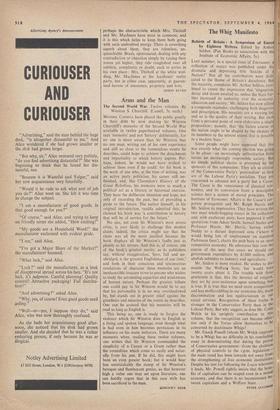Mother and Son
June in her Spring. City of Spades. Absolute Beginners. Mr. Love and justice. By Colin Maclnnes. (Penguin, 3s. 6d. each.)
'CouN ivlAc:INNes,' sighed the lady of letters during an interval in the conference: 'what a judgment on his poor mother.'
'His mother?'
'Yes, dear. I thought you'd have known. Angela Thirkell . .
When I recovered from the shock, I first checked on the information, which was as good as gold, and then started to wonder in what sense my informant, who did not use words idly, could consider Mr. MacInnes a 'judgment' on his late parent. At first I thought in crude terms of the family and its black sheep: Mrs. Thirkell presiding over the tea cups in her genteel Barset- shire and worried stiff about Mr. MacInnes, who was off. on another romp in the smoke with the teenagers and the Spades. Then it occurred to me that reference to the relationship had been made, after all, in a literary context. Slowly the penny began to drop. What my chum had meant was much more subtle, but at the same time, if you came to look at it, supremely obvious : through some quirk of inheritance, as I began to realise, Colin MacInnes's qualities as a writer were a kind of appalling parody of his mother's; it was as though he ha'd taken her style, her mannerisms, her attitudes and even her morality, detached them from the lawns and rectories of Barset, and applied them to the dance-hall and the brothel instead.
Consider, for a start, Mrs. Thirkell's senti- mentality. Exactly the same gooey delight, with which she effects the engagement of a nice young couple, is expressed by Mr. MacInnes in con- triving sexual unions between Australian adoles- cents in June in her Spring. True, these unions are technically illicit: but they're the real thing, they're for keeps, the formality of marriage will be gone through later, and meanwhile, 'He's the only boy for me, Dad, there'll never be anyone else,' etc. etc. It is all ultra-respectable--as are the sentiments about sex and love (' "The person you really dig, with all of yourself, your other half you'd give your life to" ') promulgated by the teenage narrator in Absolute Beginners.
Or take Mrs. Thirkell's assertiveness, her assurance of being in the right. This is echoed, in her son's work, by the self-satisfied language, part bumptious, part unctuous, in which every- one is for ever nagging about his right to a fair share (see City of Spades and Mr. Love and Justice passitn). By much the same token, and to the detriment of .action and plot, there is constant exhibition of irrelevant mental attitudes —page after page of complacent credo or righteous complaint about anything from drink, to national service, This vividly recalls the Thirkell technique: cf. the occasion, one among many similar, on which Mrs. Thirkell inter- rupted a big scene to remonstrate, in her own voice, with Labour Ministers who were alleged to have been rude to George VI. Along with such discursive habits, mother and son share another sort of clumsiness : a shame- less method of exposition, which consists simply in letting two or more characters catechise each other exhaustively about elementary facts which must be perfectly familiar to them all. (' "When I was only six? . . . And Arthur only eight." "Since your brother's two years older than you, that follows . ." ') Insolence of this kind lig
perhaps the characteristic which. Mrs. Thirkell and Mr. MacInnes have most in common; and it is this which helps to keep them both going with such undoubted energy. There is something superb about them; they are relentless, un- quenchable. Brash, opinionated, dealing with any contradiction or objection simply by raising their voices yet higher, they ride roughshod over all subtlety, complexity or doubt, each to arrive in his own place: Mrs. Thirkell at the white wed- ding, Mr. Maclnnes at the layabouts' reefer party, but in either case, apparently, at guaran- teed havens of innocence, propriety and love.
SIMON RAVEN







































 Previous page
Previous page